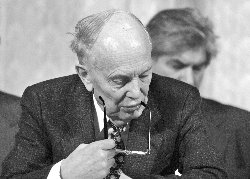Intellectuals Send a Signal to Those in Power

On February 27, the Ukraine 2003 Intellectual Forum was held. President of the National Academy of Sciences of Ukraine, Boris Paton, described the meeting as an assembly of people “who recognize that intellect is a great fortune.” The Forum, which almost packed in a full house at the National Opera, was initiated by the Ukraine Twentieth Century Fund for Intellectual Cooperation, the National Academy of Sciences of Ukraine, and the Union of the Deans of Ukrainian Universities. The event’s goal, according to its participants, was to share their views on how to stop the de-intellectualization of our society, prevent brain drain, and create favorable conditions for intellectuals in Ukraine. In his keynote speech, Borys Paton broadly used the notion of intellectual capital. In the scholar’s opinion, the existence of this capital, supporting it, and building it up is our country’s main chance to become promising and competitive.
Chairman of the Verkhovna Rada, Volodymyr Lytvyn, impressed the audience with his encyclopedic knowledge, correct references and quotations, and slight radicalism in his statements. He gave a brief account of the threats to social intellect in the globalization era (international terrorism, uncontrolled usage of new technologies, technocratic thinking, global information expansion and unification, eroded national identity, etc.). After a number of digressions into the Middle Ages and our totalitarian past, the speaker turned from general things to details, namely, to the situation in Ukraine.
His evaluations of the sphere of intellectual reproduction in Ukraine (education, technologies, innovations, the quality of state governance, etc.) reminded one of a strange tradition of top officials speaking in an opposition manner. This was especially obvious because the VR chairman was the most high-ranking state representative at the meeting (Viktor Yanukovych’s speech scheduled in the Forum’s program did not take place, obviously, for some weighty reasons). In Mr. Lytvyn’s opinion, there exist a number of negative tendencies in the sphere of social intellect. One of them is the problem that exists between intellect and power, the latter, in the speaker’s opinion, “not being representative of the society’s joint intellect.” Another is the non-competitiveness of Ukrainian production and management technologies, which, in the case of the opening of Ukrainian market, is fraught with mass bankruptcies among Ukrainian enterprises and turning Ukraine into a state not involved in or having influence on anything.
The speaker referred to the so-called “oligarch clans” as major obstacles for new technologies, innovations, and investment in Ukraine. In his view, the prospects for Ukraine are either becoming a passive subject for colonization or leaning upon its own social intellect, supporting and developing it as a foundation for prosperity. As if anticipating the audience’s perplexity, Mr. Lytvyn apologized for “not reporting” on the legislative activity aimed on developing the nation’s intellect. However, he mentioned the forty-one draft laws on this subject being examined by parliament.
Virtually all the Forum’s participants — teachers, librarians, students, and scholars — spoke about a number of key problems in the intellectual sphere: money, brain drain, lack of talented young people, the state’s irresponsibility in following social standards fixed in the legislation, and the lack of state support for science and new technologies. It is interesting that there were no realistic schemes offered by business representatives for supporting and reproducing social intellect in the country. People’s deputy Bohdan Hubsky, head of the Ukraine Twenty-First Century Fund for Intellectual Cooperation, filled in this gap. Instead of overusing the terms social intellect, intellectual capital, oligarchic clans, or innovation model of development, he remarked that the state’s wealth is in its citizens’ ability to follow the requirements of common sense and in the middle class, which includes more than just shuttle traders and money changers. Mr. Hubsky described the activity of his Fund. To solve the key problem-creating conditions for decent study and work for young people- the Fund selected 300 talented schoolchildren, winners of its competitions. Today, they study at the country’s best universities at the cost of the Fund. Incidentally, half of them are from the countryside. The deputy observed that no official was ever punished for the mass exodus of scholars and professionals abroad and promised that in the future the Fund will keep supporting talented youth and Ukrainian scholars, working on Ukraine’s restoring its historical values and national symbols, and cooperating with creative unions. At the end of his speech, Mr. Hubsky offered to found a Kyiv Scientists’ Club -where innovation decisions, new ideas, and social technologies could be tested.






